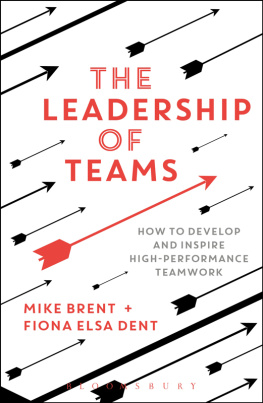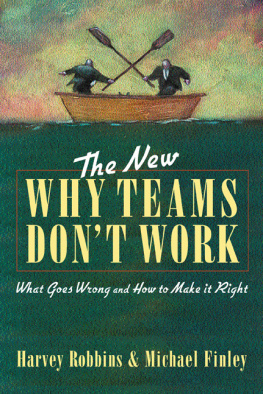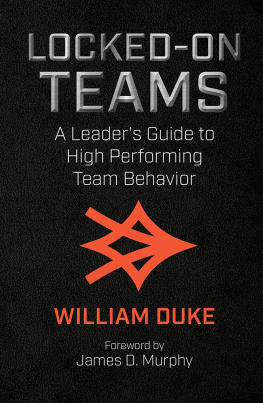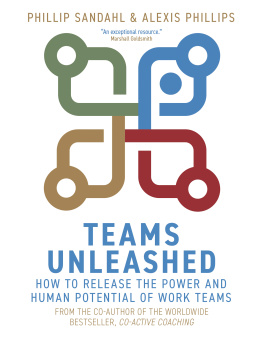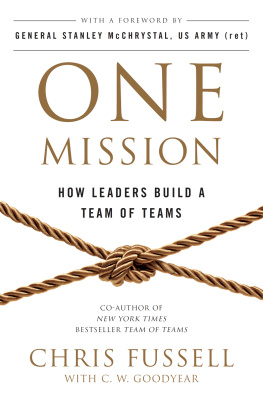THE LEADERSHIP
OF TEAMS
THE LEADERSHIP
OF TEAMS
How to develop and inspire
high-performance teamwork
MIKE BRENT AND
FIONA ELSA DENT
Bloomsbury Business
An imprint of Bloomsbury Publishing Plc

To our families
Michael Brent is Professor of Practice and Adjunct Faculty at Ashridge Executive Education, Hult International Business School, one of the leading business schools in Europe. He specializes in leadership, team-building, influencing, coaching, cross-cultural management, leading change and personal development. He now also runs his own coaching, training and consultancy company and has a particular interest in working with management teams.
He has co-authored four other books on leadership with Fiona.
Mike believes the key aspects of leadership are self-awareness, and skill and flexibility in responding to others. Managers and leaders must operate in areas where there are many dilemmas and wicked problems, and therefore must develop the ability of not knowing to go with their ability to make decisions.
Mike holds both British and French nationalities and is bilingual.
Fiona Elsa Dent is a Management Trainer, Leadership Coach and Professor of Practice at Ashridge Business School. Fiona now has a portfolio career having worked full-time for more than thirty-five years. She was a faculty member at Ashridge for twenty-four years and during her last ten years on the full-time staff she held a role on the management team as Director of Executive Education where she managed a faculty group and contributed to the strategic operation of the organization.
Fiona now enjoys a mixed portfolio of teaching, coaching, researching and writing. She still contributes to a variety of programmes at Ashridge and also works for a range of clients as a management trainer and coach. She enjoys researching and writing and since moving to a portfolio role has published three books in addition to this one: The Leaders Guide to Managing People, The Leaders Guide to Coaching and Mentoring, both with her co-author Mike Brent, and How to Thrive and Survive as a Working Woman: The Coach Yourself Toolkit with her co-author Viki Holton.
We would like to express our appreciation to all the managers who have over the years attended our leadership development programmes and been able to tell their leadership and team stories. We also wish to thank those who actively contributed to our thought processes in writing this book.
Our thanks go to Ian Bell, Alan Gentle, Alex Davda, Hans Friberg, Helena Gaunt, Helen Bailey, Francoise Nash, Mike Stonor, Stuart Green, Peter Hawkins, Viki Holton, Sue Honore, Tom Powers, Dr Mark Lowther, Dame Carolyn McCall, Dr Mark McKergow, Dominic Mahoney, Nigel Melville, Carina Paine Schofield, Will Shorten, Tamsin Simmons, Rolf, Christoph, Simon, Pierluigi, Gery, Jane, Feisal and Laurent from the 1st Host Leadership Conference and to Tony (Spreaders) Spreadbury and his team at the England Rugby Football Union.
Special thanks to Sharon West and Mike Dell for their support.
In our work we hear the words teams and teamwork constantly, and we were struck by the fact that very few people in teams ever reflect on what exactly a team is, how it works or how it could work even better. What exactly is a team? And do we always need teams to do the work? Is there a difference between a team and a group?
So we decided to explore the world of teams and find out what they are, if and when they are necessary, and what could be learned about both leading and participating in teams. We looked at the research, called on our own experience of leading and working both in and for teams, observed teams and interviewed team leaders and members from a variety of different fields, including the business world, the arts, sport, the military and medicine.
Where does the word team come from?
The word team derives from the old English and Norse word for bridle, and from that came the meaning of a set of animals, harnessed together, which would pull ploughs to till the land. From this definition comes the analogy of people involved in joint action. The concept of team must be one of the most commonly used ideas in organizational life. However, we think that it is overused, in the sense that many so-called teams are not in fact real teams.
A research report by Deloitte University Press (2016) stated that Businesses are reinventing themselves as networks of teams in order to keep pace with the challenges of a fluid unpredictable world.
We believe that there is significant progress to be made in how teams work effectively, and that team leaders and team members can realize the full potential of effective teamwork. We hope that this book can contribute to this progress.
In our experience, working with many different types of teams across many businesses, organizations and countries, we have often found that the team leader had no specific training either in psychology or in team dynamics. They were often highly skilled individuals in their specific technical area, but lacking in the skills that would help them make the most of their teams potential. We specifically found it disheartening when the so-called team leader did not involve or engage all the members of the team, or when the leader ignored contributions, or worse still, dismissed ideas as being rubbish. Its not enough just to have the title of team leader; we believe that there is a need for the leader to gain specific knowledge and training in order to unlock the teams full potential.
In this book, we offer a practical and comprehensive review of teams and teamwork. We discuss why effective teamwork is so important and also examine many different aspects of teams, team leadership and team membership. Some of what we offer are reminders about some of the well-known theories and models such as team roles, team processes and stages of team development. We discuss how to deal with issues such as trust, engagement, conflict, politics and change in the team. We also give ideas on tools and techniques for team success, such as how to coach, influence and facilitate teams. We highlight the dangers of team members derailing and how to avoid it. Finally, we look at the future of teams where we believe that all team members, not just the team leader, should be able to have the skills to lead the team effectively.
We hope that in addition to refreshing your knowledge of teams and team working, you will find some useful new ideas, tips and techniques. The book is designed so that you can dip in and out of it, and we hope that it will help you to become an even more effective team leader and team member.
T Together
E Everyone
A Achieves
M More
What is a team?
The usual definition of a team is, A small group of people with complementary skills and a common purpose (Katzenbach and Smith 1993). Small, because too many people and a team will be ineffective. The accepted range for an effective number of people in a team tends to be between five and twelve people, although Wharton Business School professor Jennifer Mueller concludes that six is optimal. Although important, the number of people is not as important as the quality of the people and the type of leadership demonstrated within the team. We suggest that teams work best when they have members who have complementary skills and approaches. Having people with different skills and preferences will help to gain the maximum amount of diversity to achieve the team goals and success. For the team to achieve anything, it should also have discussed and agreed its common purpose. Its actually quite amazing how many so-called teams exist which have not discussed the issue of complementarity or indeed defined any common purpose.
Next page
